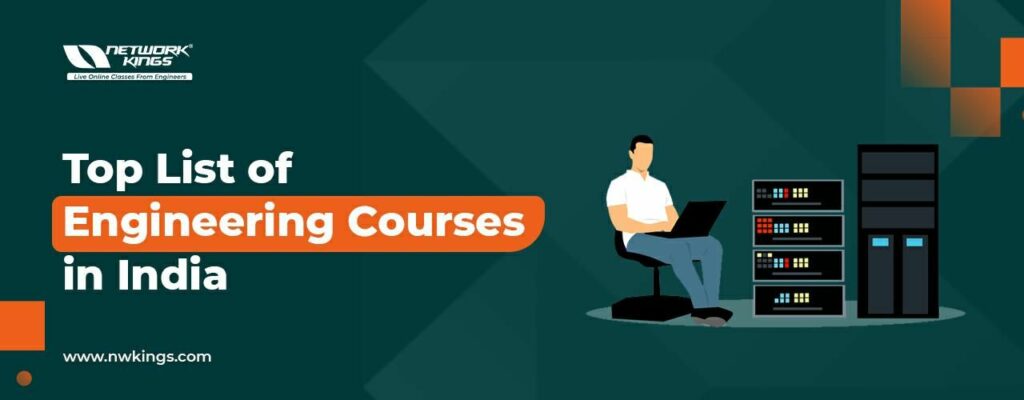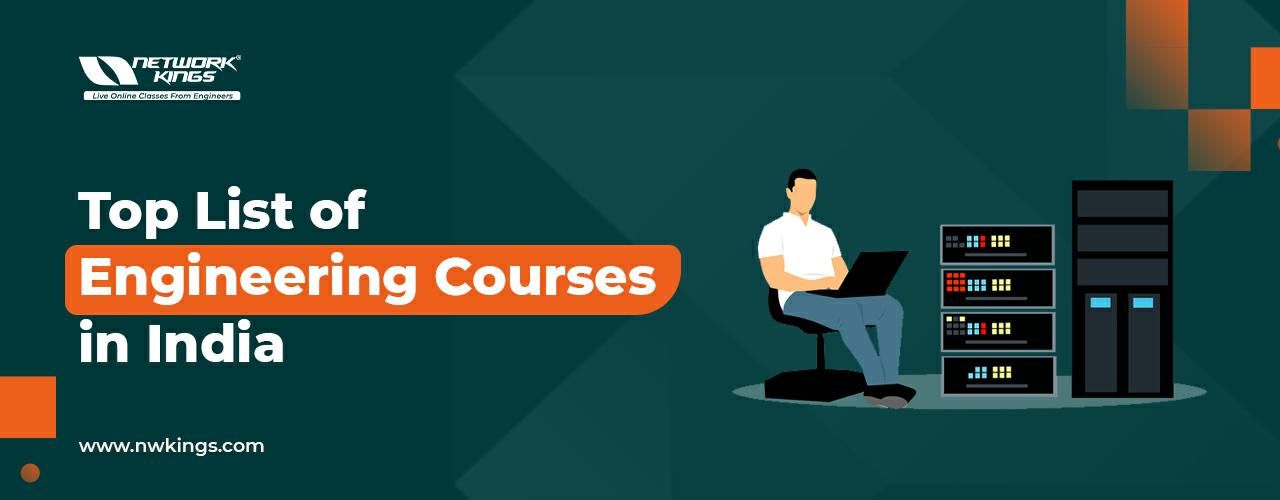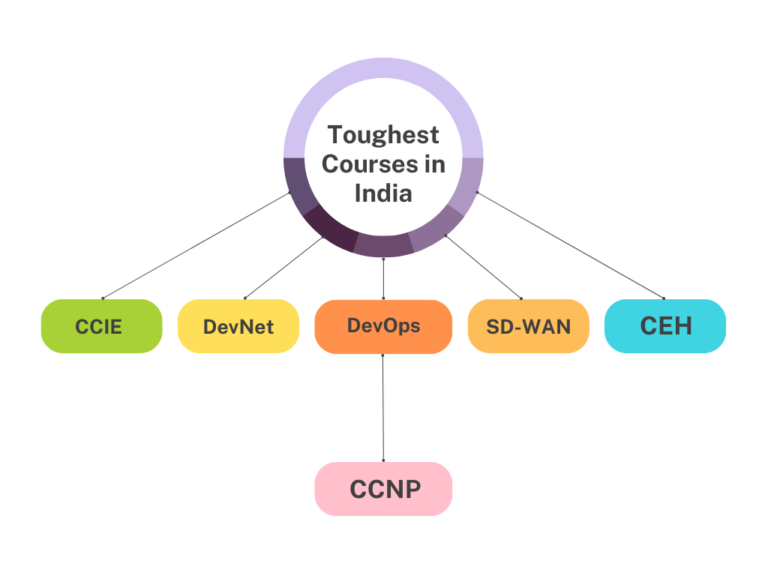
Let us dive deep into the exciting world of IT engineering courses. We will be covering everything from programming languages to software development, networking, cybersecurity, database management, and systems analysis. With hands-on projects and theoretical knowledge, you will sharpen your critical thinking, problem-solving, and analytical skills – all crucial for keeping up in the ever-evolving IT landscape. So come along as we explore the thrilling journey of IT Engineering courses and career opportunities!
What is the importance of engineering courses?
The importance of engineering courses can be understood as follows-
- Solving Problems: Engineering helps us learn how to solve tricky problems step by step, which makes our brains super smart.
- Being Creative: Engineers get to think up new ideas and make cool stuff that helps solve real-world problems.
- Building Things: They design and build important stuff like roads, bridges, and buildings that we all use every day.
- Making Technology Better: Engineering teaches us how to create new gadgets and tech that make life easier and more fun.
- Protecting the Environment: Engineers find ways to help the planet by coming up with eco-friendly solutions for things like climate change and pollution.
- Helping the Economy: By inventing new things, engineers create jobs and help businesses grow, which makes the economy stronger.
- Connecting the World: They build networks and systems that keep us all connected, making it easier for us to talk and trade with people all over the world.
- Improving Healthcare: Engineers make cool medical tools and devices that help doctors take better care of us when we are sick.
- Making Life Better: They design things that make life more comfortable and enjoyable, like energy-saving systems and clean water tech.
- Keeping Us Safe: Engineering keeps us safe by making sure things like buildings and transportation systems are sturdy and secure.
- Exploring Space: Engineers design rockets and spacecraft that let us explore outer space and learn more about the universe.
- Working Together: Engineering classes often involve teamwork with people from different fields, which helps us learn from each other.
- Always Learning: Engineers keep learning even after they finish school because technology is always changing and they want to stay up-to-date.
- Being Ethical: They think about how their work affects society and the environment, making sure they do things in a way that is good for everyone.
- Solving Big Problems: In a world facing challenges like too many people, not enough resources, and crowded cities, engineers are the ones who come up with smart solutions to make things better for everyone.
Why choose engineering courses in India?
One must choose to opt for engineering courses in India because of the following aspects-
- Good Reputation: India is known for great engineering schools that give top-notch education and do important research.
- Lots of Choices: You can study different things like computers, machines, electronics, buildings, whatever you are into.
- Affordable: Compared to other countries, studying engineering in India doesn’t cost as much, so it is good for students from here or from other places.
- Work Experience: India’s growing economy means lots of chances for engineering students to get real-life experience through internships and projects with companies.
- Innovation Hotspot: India is becoming a big place for new ideas, especially in fields like technology, biotech, and clean energy, so there is room for cool projects and startups.
- Respected Worldwide: Getting an engineering degree from India is valued all over the world, so you have opportunities both here and abroad.
- Different Cultures: India’s diverse culture lets you learn from people with all kinds of backgrounds, which is great for understanding different perspectives.
- Government Support: The government here has programs to help students and schools with scholarships, grants, and funding.
- Networking: Lots of students from different places come to study engineering in India, so you can make connections that might help your future career.
- Good Facilities: Many engineering colleges in India have modern facilities and resources for research, so you can get hands-on experience.
- Job Opportunities: Good engineering colleges here have ties with big companies, so you have good chances of landing a job after graduation.
- Career Growth: Engineers from India are wanted by big companies and research institutions worldwide, so there is potential for a successful career.
- Making a Difference: Engineering education here teaches you to think about solving big problems that can help society, so you can use your skills for good.
- Flexible Learning: You can choose what you want to specialize in and adjust your studies to fit your interests and career goals.
- Personal Development: Besides learning academics, studying engineering in India lets you grow personally by experiencing different cultures and languages.
NOTE: Enroll on our career-oriented Master’s Programs to acquire the skills you need to land a high-paying job.
What are the types of engineering courses?
IT engineering courses cover a lot of different areas in computers and technology. Here are some examples:
- Computer Science Engineering: This is about creating software and programs.
- Software Engineering: This is about making software and programs using engineering principles.
- Information Systems Engineering: This is about organizing and managing information in businesses.
- Network Engineering: This is about setting up and managing computer networks.
- Cybersecurity Engineering: This is about keeping computer systems safe from hackers and cyber attacks.
- Data Science and Engineering: This is about analyzing and using big sets of data.
- Artificial Intelligence and Machine Learning Engineering: This is about making computers smart and able to learn.
- Database Engineering: This is about organizing and managing data in databases.
- Information Technology Management: This is about leading and managing IT projects in a business.
- Cloud Computing and DevOps Engineering: This is about managing cloud-based services and improving collaboration in software development.
- Embedded Systems Engineering: This is about designing specialized computing devices for specific tasks.
- Mobile Application Development: This is about creating apps for smartphones and tablets.
- Web Development and Engineering: This is about creating and managing websites and web applications.
- User Experience (UX) and User Interface (UI) Design: This is about making software easy and enjoyable to use.
- Information Technology Infrastructure Engineering: This is about setting up and managing IT systems like servers and networks.
- Robotics and Automation Engineering: This is about designing and building robots and automated systems.
- Health Information Technology (Health IT) Engineering: This is about developing IT solutions for healthcare.
- Game Development and Engineering: This is about creating video games and entertainment software.
- Bioinformatics and Computational Biology: This is about using computers to study biological data.
- Geographic Information Systems (GIS) Engineering: This is about creating software for mapping and analyzing geographic data.
- IoT (Internet of Things) Engineering: This is about connecting physical devices to the Internet.
- Augmented Reality (AR) and Virtual Reality (VR) Development: This is about creating immersive digital experiences.
- Big Data Engineering: This is about managing and analyzing large sets of data.
- Quantum Computing Engineering: This is about developing super-fast computers using quantum mechanics.
- Human-Computer Interaction (HCI) Engineering: This is about making computers easier to use.
- Blockchain Engineering: This is about developing secure digital transaction systems.
- Cryptography and Information Security Engineering: This is about keeping digital information safe.
- Natural Language Processing (NLP) and Computational Linguistics: This is about teaching computers to understand human language.
- Wireless and Mobile Communication Engineering: This is about designing and managing wireless networks.
- Enterprise Systems Engineering: This is about creating and integrating complex IT systems for big organizations.
- Bioengineering and Biomedical Informatics: This is about using technology in biology and medicine.
- Renewable Energy Systems Engineering: This is about using technology to manage renewable energy sources.
- Aerospace and Aeronautical Engineering: This is about designing and analyzing aerospace systems.
- Smart Grid and Energy Management Systems Engineering: This is about improving electrical power grids.
- Supply Chain and Logistics Engineering: This is about optimizing supply chain operations.
- Financial Technology (FinTech) Engineering: This is about using technology in finance.
- Sustainable Development and Environmental Engineering: This is about using technology to help the environment.
- Educational Technology (EdTech) Engineering: This is about using technology in education.
- Smart Cities and Urban Planning Engineering: This is about using technology to improve cities.
- Legal Technology (LegalTech) Engineering: This is about using technology to improve legal processes.
What is the list of top engineering disciplines?
The list of top in-demand IT engineering disciplines is as follows-
Network engineers work with computer networks. They set up and manage networks like the Internet or the network in your office. They use devices like routers and switches to make sure everything runs smoothly and securely. They are like the architects and maintenance crew for digital highways.
NOTE: Enroll on our career-oriented Network Engineer Master’s Program to acquire the skills you need to land a high-paying job.
Cybersecurity engineers keep your digital stuff safe from bad guys. They create rules and tools to protect computers, networks, and data from hackers and other threats. They are like the security guards and police officers of the digital world, making sure everything stays secure.
NOTE: Enroll on our career-oriented Cyber Security Engineer Master’s Program to acquire the skills you need to land a high-paying job.
Cloud engineers work with online storage and services. Think of it like renting space on a digital cloud to store your files or run your programs. They make sure everything in the cloud works well and is safe to use. They are like the caretakers and organizers of the digital sky, keeping everything running smoothly.
NOTE: Enroll on our career-oriented AWS Cloud Security Engineer Master’s Program to acquire the skills you need to land a high-paying job.
DevOps engineers help software get from the computer programmer’s desk to your device. They automate the process of making sure new software is built correctly, tested thoroughly, and then put into use smoothly. They are like the efficient movers and organizers of digital software, ensuring everything is in its place and works as it should.
NOTE: Enroll on our career-oriented DevOps Engineer Master’s Program to acquire the skills you need to land a high-paying job.
How to choose the right online engineering course?
To find the perfect online IT engineering course, you need to think about what you want, how you learn best, and what fits your goals. Here is a guide to help you make a smart choice:
- Know Your Goals: Figure out what you want from the course. Do you want to learn new skills, move up in your career, or switch to a different area in IT engineering?
- Explore Options: Look into different online courses from well-known universities, institutions, or online platforms. Check out the course content, syllabus, length, accreditation, and what others say about them.
- Check the Curriculum: Make sure the course covers what you want to learn. Look for topics like programming languages, cybersecurity, databases, and software development.
- Assess Your Level: See if the course matches your skill level. Some are for beginners, while others are more advanced. Pick one that suits where you are at so you can keep up.
- Think About How You Learn: Consider how you prefer to learn. Do you like watching videos, live sessions, or interactive modules? Choose a format that works for you.
- Look at the Instructors: Check out the people teaching the course. Make sure they have the right experience and knowledge in IT engineering.
- Check Accreditation: If it matters to you, find out if the course or the place offering it is accredited by relevant bodies.
- Read Reviews: See what others have to say about the course, the instructors, and the overall experience. Pay attention to things like content quality and support.
- Consider Costs and Aid: Think about how much the course costs and if there are options for financial help like scholarships or payment plans.
- Check Flexibility and Support: Look into how flexible the course is with deadlines and accessing materials.
- Try Before You Buy: If you can, see if there is a free trial or demo so you can get a feel for the course before committing.
- Look into Career Services: If you are aiming to boost your career, see if the course offers help with providing essential job skills or career guidance.
What are the challenges faced by the students pursuing engineering courses?
The challenges faced by the students pursuing engineering courses are as follows-
- Heavy Workload: Engineering programs are known for their demanding curriculum, which can be overwhelming. Managing assignments, projects, and exams while balancing other commitments can be a struggle for students.
- Complex Concepts: Engineering subjects involve intricate mathematical and technical concepts that can be difficult to grasp. Students may need to invest extra time and effort to fully understand and apply these principles.
- High Academic Standards: Engineering programs typically have high academic expectations, requiring students to maintain a certain GPA. This pressure to excel academically can add stress to students’ lives.
- Technical Skills Development: Engineering courses emphasize the development of technical skills such as programming and problem-solving. Students may face challenges in mastering these skills, especially if they are new to the subject matter.
- Team Projects and Collaboration: Many engineering courses involve collaborative projects, which can present challenges related to communication and coordination among team members.
- Laboratory Work and Experiments: Hands-on laboratory work is a key component of engineering education, but it can be challenging. Students may encounter difficulties in conducting experiments and interpreting results.
- Lack of Resources: Some engineering programs may struggle to provide adequate resources such as equipment and research facilities, which can hinder students’ learning experiences.
- Faculty Inavailability: Limited availability of faculty members for academic support and guidance can pose challenges for students seeking assistance.
- Balancing Extracurricular Activities: Engineering students often juggle extracurricular activities with their academic responsibilities, requiring effective time management skills.
- Career Preparation and Placement: Navigating the job market and securing internships or employment post-graduation can be challenging for engineering students. Career services provided by institutions may vary in effectiveness.
What are the future trends in engineering courses?
The future trends in engineering courses can be discussed as follows-
- Interdisciplinary Approach: Engineering programs are embracing an interdisciplinary approach, blending concepts from various engineering fields, computer science, data science, and sustainability. This shift acknowledges the complexity of modern engineering challenges and the need for comprehensive solutions.
- Focus on Emerging Technologies: Courses are adapting to focus on emerging technologies like AI, machine learning, IoT, blockchain, robotics, and renewable energy. These cutting-edge technologies are transforming industries, prompting engineering programs to integrate them into their curriculum.
- Project-Based Learning: There is a move towards project-based learning, where students tackle real-world engineering projects from start to finish. This hands-on approach fosters practical skills, critical thinking, and problem-solving abilities while addressing industry-specific challenges.
- Remote and Online Learning: The pandemic has accelerated the adoption of remote and online learning in engineering education. Institutions are investing in virtual labs, simulation software, and remote access to equipment to provide quality education to students, regardless of their location.
- Emphasis on Soft Skills: Alongside technical skills, there is a growing emphasis on soft skills such as communication, teamwork, creativity, adaptability, and leadership. Engineering programs are integrating courses or workshops focused on developing these skills to prepare students for diverse career paths.
- Sustainability and Green Engineering: Environmental sustainability is gaining importance in engineering education, with courses incorporating principles of green engineering and sustainable design. Topics like renewable energy, waste reduction, and environmental impact assessment are becoming integral parts of the curriculum.
- Data-Driven Engineering Education: The integration of data analytics and data-driven decision-making is becoming crucial. Courses are incorporating data analysis techniques, statistical methods, and computational tools to analyze engineering data for design and optimization purposes.
- Global Collaboration and Experiential Learning: Engineering programs are fostering global collaboration through partnerships with international institutions, industry projects, and study abroad programs. This exposes students to diverse perspectives and engineering practices, enhancing their global competency.
- Professional Development and Lifelong Learning: There is a shift towards emphasizing continuous professional development and lifelong learning in engineering education. Institutions are offering flexible learning pathways, micro-credentials, and continuing education programs to keep engineers updated with the latest advancements.
- Ethical and Social Responsibility: Engineering courses are incorporating ethics, social sciences, and sustainability principles to address societal challenges. Students are encouraged to consider the broader impacts of their work on society and the environment, fostering a sense of ethical and social responsibility.
Where to pursue the best engineering courses?
You can get the best IT engineering courses at Network Kings, where you can learn directly from experts. The student-oriented training helps to understand cloud computing better by providing 24*7 access to the world’s biggest virtual labs with zero downtime.
At Network Kings, you will get to enjoy the following perks-
- Learn directly from expert engineers
- 24*7 lab access
- Pre-recorded sessions
- Live doubt-clearance sessions
- Completion certificate
- Flexible learning hours
- And much more.
NOTE: Enroll on our career-oriented Master’s Programs to acquire the skills you need to land a high-paying job.
What are the salary aspects of an Engineer?
The salary aspects of an Engineer in different countries are as follows-
- United States: USD 100,000 – USD 180,000 per year
- Canada: CAD 90,000 – CAD 140,000 per year
- United Kingdom: GBP 50,000 – GBP 90,000 per year
- Germany: EUR 60,000 – EUR 100,000 per year
- France: EUR 50,000 – EUR 90,000 per year
- Spain: EUR 35,000 – EUR 65,000 per year
- Italy: EUR 40,000 – EUR 70,000 per year
- India: INR 600,000 – INR 1,800,000 per year
- Netherlands: EUR 50,000 – EUR 90,000 per year
- Sweden: SEK 480,000 – SEK 720,000 per year
- Switzerland: CHF 100,000 – CHF 160,000 per year
- Australia: AUD 150,000 – AUD 180,000 per year
- New Zealand: NZD 90,000 – NZD 130,000 per year
- Singapore: SGD 70,000 – SGD 120,000 per year
- Japan: JPY 7,000,000 – JPY 12,000,000 per year
Wrapping Up!
Grab this chance to upgrade and become a top-notch IT Engineer today. If you are looking to learn prominent IT engineering skills, consider enrolling in our top-notch IT engineering courses designed as Master’s Programs. Should you have any questions or require assistance, please do not hesitate to reach out to us through the comment section. Your queries are welcome, and we are here to help!
Happy Learning!





